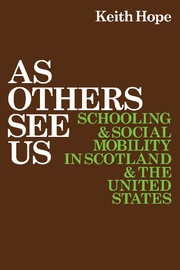Book contents
- Frontmatter
- Contents
- Acknowledgments
- Introduction
- 1 Scotland: A meritelective system?
- 2 Comparison of Scotland with England and Wales
- 3 Comparison of Scotland with the United States
- 4 IQ + effort = merit
- 5 The institutions of managed meritelection
- 6 Was selection carried out fairly?
- 7 Meanings of key terms
- 8 Does deprivation affect life chances?
- 9 Market situation
- 10 Intelligence and occupational mobility
- 11 Intelligence and vertical mobility
- 12 Scottish society
- 13 Understanding other people's norms
- 14 Merit or desert?
- Notes
- References
- Index
- Frontmatter
- Contents
- Acknowledgments
- Introduction
- 1 Scotland: A meritelective system?
- 2 Comparison of Scotland with England and Wales
- 3 Comparison of Scotland with the United States
- 4 IQ + effort = merit
- 5 The institutions of managed meritelection
- 6 Was selection carried out fairly?
- 7 Meanings of key terms
- 8 Does deprivation affect life chances?
- 9 Market situation
- 10 Intelligence and occupational mobility
- 11 Intelligence and vertical mobility
- 12 Scottish society
- 13 Understanding other people's norms
- 14 Merit or desert?
- Notes
- References
- Index
Summary
In the foregoing chapters we have shown that Scottish society, as it is reflected in the experience of the first cohort of men to fall within the ambit of the postwar reorganization of secondary education, was meritelective. We use the term meritelective to denominate a system in which merit is the approved engine of social ascent at all or most levels of the social scale. It contrasts with meritocracy, which refers to a system in which merit is the criterion for selecting those who are to hold political or bureaucratic power. We do not know whether the 1936 birth cohort was more meritelective, or evinced more social or occupational mobility, than its predecessors. It is plausible to suppose that Scotland did in fact become more meritelective with the passing of the 1945 Education Act, though whether temporarily or permanently it is impossible to say. Any sudden burst of upward mobility for men born in a narrow range of years might have the paradoxical effect of blocking mobility for their successors. But an increase in upward mobility, such as probably occurred (for men) in the post-World War II years, is not the same thing as an access of meritelection, and the probable effect of the association of the two is not at all clear.
It is almost certainly the case that the meritelective system instituted in 1945 was but a formalization and generalization of a way of doing things which was already well established in the norms and practices of Scottish society.
- Type
- Chapter
- Information
- As Others See UsSchooling and Social Mobility in Scotland and the United States, pp. 229 - 240Publisher: Cambridge University PressPrint publication year: 1985



